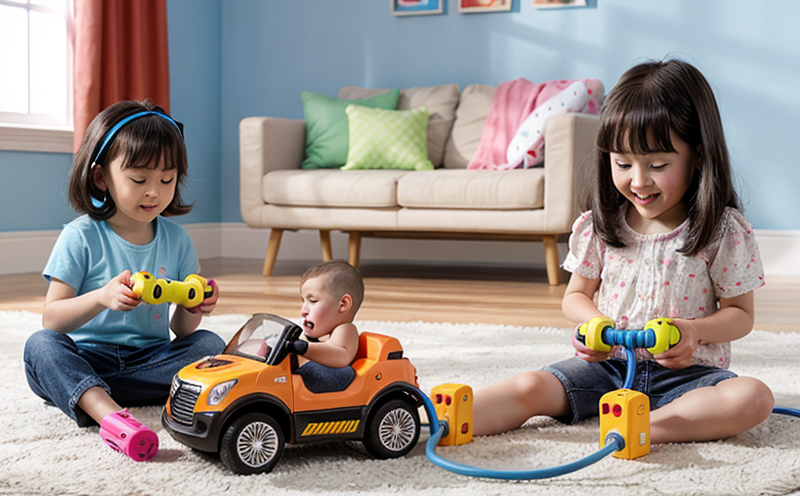ISO 8124-4 Mechanical Strength of Electrical Toys
The ISO 8124 series of standards is specifically designed to ensure toy safety and quality. Among these, the fourth part—ISO 8124-4:2019 deals with mechanical strength testing for electrical toys. This service ensures that toys are robust enough to withstand normal play conditions without compromising on safety.
The primary focus of this test is to evaluate the resistance of toy components and assemblies against forces such as bending, twisting, and impact. The objective is to ensure that even when subjected to typical stresses encountered during use or accidental rough handling, electrical toys remain intact and do not pose any risk of injury.
The mechanical strength testing for electrical toys involves rigorous procedures aimed at assessing the durability and integrity of different parts including but not limited to:
- Plastic components
- Metallic structures
- Battery compartments
- Cables and connectors
The testing process is meticulously designed to mimic real-world scenarios where children interact with toys. The aim is to identify potential weaknesses that could lead to hazards such as sharp edges, splinters, or exposed electrical parts.
For instance, the test requires placing a specified weight on various components of an electrical toy and recording how it responds under load. Similarly, shock testing involves applying controlled impacts to check for resilience against falls or drops. By adhering strictly to ISO 8124-4 guidelines, manufacturers can ensure their products meet international safety standards.
Another critical aspect is the evaluation of battery compartments. This includes checking whether they can hold batteries securely without any risk of leakage or detachment during use. The test also examines how well these compartments are sealed against dust and moisture ingress which could affect functionality over time.
The results from ISO 8124-4 testing provide valuable insights into the robustness of electrical toys. They help manufacturers improve designs by highlighting areas needing enhancement or redesign. Compliance with this standard also enhances brand reputation, building trust among consumers who prioritize safety above all else when choosing playthings for their children.
Moreover, successful completion of these tests serves as proof that a product adheres to global regulatory requirements set forth by bodies like the International Organization for Standardization (ISO). This not only opens up markets but also fosters confidence among potential customers looking for reliable products.
Scope and Methodology
The scope of ISO 8124-4 covers all types of electrical toys intended for use by children. These include but are not limited to:
- Remote-controlled cars
- Battery-powered dolls
- Educational kits with interactive features
- Games involving light and sound effects
The methodology employed in this testing procedure is exhaustive, covering various stages from initial setup to final analysis. Here’s a brief overview:
- Preparation of Specimens: Each toy undergoes thorough preparation ensuring it represents the actual product being tested.
- Bending Tests: Components are subjected to bending forces to determine their flexibility and strength.
- Torsion Tests: Similar to bending, but focusing on twisting motions typical of certain actions children perform with toys.
- Impact Testing: Simulating drops from heights relevant to accidental use by children. This assesses the toy’s ability to absorb impact without breaking or becoming hazardous.
The testing environment closely replicates conditions found in households, schools, and other locations where toys are used regularly. The aim is to identify any potential risks early on so that necessary adjustments can be made before the product reaches market shelves.
Why Choose This Test
Selecting ISO 8124-4 mechanical strength testing for electrical toys offers numerous benefits to toy manufacturers:
- Compliance with Global Standards: Ensures adherence to international safety regulations, making it easier to enter new markets.
- Risk Management: Identifies potential hazards early in the development process reducing costly recalls later down the line.
- Quality Assurance: Provides assurance that products meet strict quality benchmarks thereby enhancing consumer confidence.
- Enhanced Reputation: Demonstrates commitment to safety and quality which significantly boosts brand image.
In addition, successful completion of these tests can lead to increased sales as consumers increasingly value safer toys. It also supports continuous improvement initiatives helping companies stay ahead in an ever-evolving industry landscape.
By choosing this service, toy manufacturers ensure they are meeting the highest standards set by international organizations like ISO while contributing positively towards public health and welfare.
Competitive Advantage and Market Impact
Adhering to ISO 8124-4 mechanical strength testing for electrical toys provides significant competitive advantages:
- Market Access: Compliance with global standards opens doors to international markets.
- Consumer Trust: Demonstrates a strong commitment to safety, instilling trust among consumers and parents alike.
- Differentiation: Sets products apart from competitors by highlighting superior quality and reliability.
- Sustainability: By ensuring toys last longer due to enhanced mechanical strength, companies contribute positively towards sustainable practices.
The positive impact on market share cannot be overstated. Parents are more likely to buy products that they perceive as safe and reliable. This trust translates directly into higher sales figures and customer loyalty. Furthermore, maintaining compliance with these standards helps maintain a good reputation which is crucial for long-term business success.





